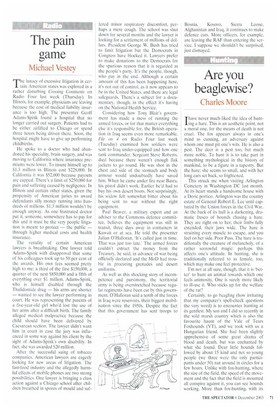The pain game
Michael Vestey
The lunacy of excessive litigation in certain American states was explored in a rather disturbing Crossing Continents on Radio Four last week (Thursday). In Illinois, for example, physicians are leaving because the cost of medical liability insurance is too high. The presenter Geoff Adams-Spink found a hospital that no longer carried out surgery. Patients had to be either airlifted to Chicago or spend three hours being driven there. Soon, the hospital might have to give up performing childbirths.
He spoke to a doctor who had abandoned his speciality, brain surgery, and was moving to California where insurance premiums were lower, To insure himself up to $1.3 million in Illinois cost $228,000. In California it was $52,000 because payouts are capped. There's a limit of $250,000 for pain and suffering caused by negligence. In Illinois and certain other states, given the propensity of American juries to award defendants silly money running into hundreds of millions. $1.3 million wouldn't be enough anyway. As one frustrated doctor put it, someone, somewhere has to pay for this and it must be the very people litigation is meant to protect — the public — through higher medical costs and health insurance.
The venality of certain American lawyers is breathtaking. One lawyer told Adams-Spink with disapproval that some of his colleagues took up to 50 per cent of the awards. His own fees seemed pretty high to me: a third of the first $150,000, a quarter of the next $850,000 and a fifth of everything over $1 million, Adams-Spink. who is himself disabled through the Thalidomide drug — his arms are shorter — wanted to see the lawyer performing in court. He was representing the parents of a five-year-old girl who'd lost the use of her arms after a difficult birth. The family alleged medical malpractice because the child should have been delivered by Caesarean section. The lawyer didn't want him in court in case the jury was influenced in some way against his client by the sight of Adams-Spink's own disability. In fact, she was awarded $20 million.
After the successful suing of tobacco companies, American lawyers are eagerly looking for new areas of litigation. The fast-food industry and the allegedly harmful effects of mobile phones are two strong possibilities. One lawyer is bringing a class action against a Chicago school after children breathed in spores of mould and suf
fered minor respiratory discomfort, perhaps a mere cough. The school was shut down for several months and the lawyer is looking for a settlement of millions of dollars. President George W. Bush has tried to limit litigation but the Democrats in Congress have blocked it. Lawyers prefer to make donations to the Democrats for the spurious reason that it is regarded as the people's party. It's the people, though, who pay in the end. Although a certain amount of this has been happening here, it's not out of control, as it now appears to be in the United States, and there are legal safeguards. There's a subject for a documentary, though, in the effect it's having on the National Health Service.
Considering how Tony Blair's government has made a mess of running the armed forces, or for that matter everything else its responsible for, the British operation in Iraq seems even more remarkable. File on 4 on Radio Four last week (Tuesday) examined how soldiers were sent to Iraq under-equipped and how one tank commander. Sergeant Steve Roberts, died because there weren't enough flak jackets to go round, He was shot in the chest and side of the stomach and body armour would undoubtedly have saved him. When he came under fire near Basra, his pistol didn't work. Earlier he'd had to buy his own desert boots. Not surprisingly, his widow felt somewhat bitter about his being sent to war without the right equipment.
Paul Beaver, a military expert and an adviser to the Commons defence committee, believes the equipment was still in transit, three days away in containers in Kuwait or at sea. He told the presenter Julian O'Halloran, 'It's called just in time. That was just too late,' The armed forces couldn't extract the money from the Treasury, he said, in advance of war being officially declared and the MoD had trouble in procuring grenades and desert uniforms.
As well as this shocking story of incompetence and parsimony, the territorial army is being overstretched because regular regiments have been cut by this government. O'Halloran said a tenth of the forces in Iraq were reservists, their biggest mobilisation since the 1950s. Despite the fact that this government has sent troops to Bosnia, Kosovo, Sierra Leone, Afghanistan and Iraq, it continues to make defence cuts. More officers, for example, are leaving the RAF than entering the service. I suppose we shouldn't be surprised, just dismayed.


























































































 Previous page
Previous page